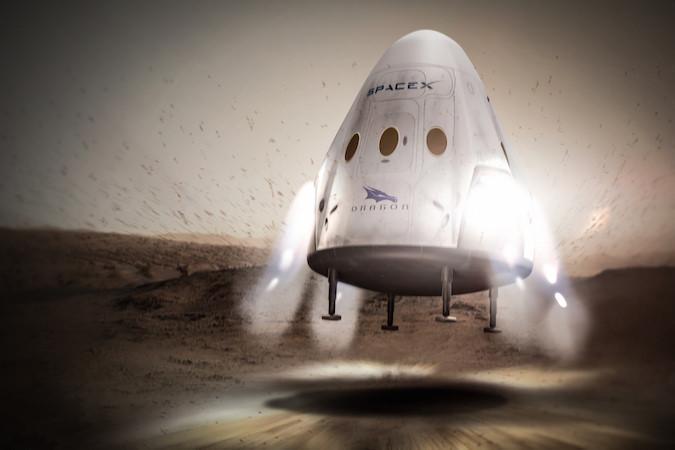Aerospace engineering will reach another milestone when SpaceX and NASA launch the Red Dragon on a mission to reach Mars. Elon Musk has announced that by May 2018, they want to be prepped and ready to go to Mars. The mission will see a bigger version of the Falcon 9 - which successfully landed itself on a barge earlier this year - known as the Red Dragon, enable a capsule to land on the surface of Mars.
The end game for SpaceX would be getting more spacecraft to Mars and starting a colony on the planet. Musk is planning to let the media in on their plans for colonization of Mars in September. This keynote will happen at the International Aeronautical Congress in Mexico.
 Credit: SpaceX
Credit: SpaceX
The 2018 launch will be an unmanned launch and will see the Red Dragon travel to Mars and attempt to land on the surface. According to Musk's twitter, the engineer said: "Dragon 2 [the spacecraft travelling to Mars] is designed to be able to land anywhere in the solar system. Red Dragon Mars missions are the first test flight." This means that Mars is not the only planet SpaceX is considering.
"Building on an existing no-funds-exchanged collaboration with SpaceX, NASA will provide technical support for the firm's plan to attempt to land an uncrewed Dragon 2 spacecraft on Mars. This collaboration could provide valuable energy entry, descent, and landing data to NASA for our journey to Mars while providing support to American industry," NASA said in a statement.
NASA intends to take humans to Mars by 2030, hence their involvement in the SpaceX launch. Both companies want to theoretically entertain the idea of sending humans to the Red Planet and the data that comes from this mission would be beneficial to both of them.
SpaceX has also announced they were successfully awarded an $83 million contract to launch a GPS satellite into space, funded by the US Air Force. Lockheed Martin, an aerospace engineering and design company - who are busy working on the next Concord-like aircraft - used to be the only company entrusted with space launches but it seems SpaceX's recent successes in the industry has changed the game up.
A Lieutenant General Samuel Greaves, head of the air force's Space and Missile Systems Centre, told the Guardian: "This GPS III launch services contract award achieves a balance between mission success, meeting operational needs, lowering launch costs, and reintroducing competition for national security space missions."
